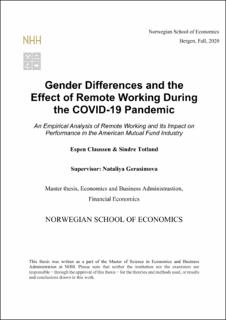| dc.description.abstract | During the COVID-19 pandemic, forced remote working has been an important tool for authorities all over the world attempting to stop the spread of the virus. Looking at gender, early reports indicate a disproportionate impact of the remote working effect on performance, disfavoring women. Our thesis seek to investigate this remote working effect on gender performance for active mutual fund managers, hoping to see if it can help explain the industry’s long-lasting disparity in gender representation. We use data on returns for 2695 actively managed U.S.-domiciled funds during the COVID-19 crisis to investigate the effect of remote working on fund performance. We identify each state’s lockdown period, enabling us to use the staggered state-level adoption of the stay-at-home orders to conduct difference-in-differences analyses on both fund profitability and managerial skill. First, we investigate the role of gender on fund profitability by looking at both raw returns and factor-adjusted returns, hypothesizing that: (1) The effect of working from home during the COVID-19 crisis deteriorates factor-adjusted returns more for active mutual funds managed by women, compared to active mutual funds managed my men. Our results show no significant difference in the effect of working from home on mutual fund profitability between the genders. Secondly, we investigate the role of gender on managerial skill to identify how this is effected by the remote working effect, hypothesizing that: (2) The effect of working from home during the COVID-19 crisis deteriorates managerial skills more for female mutual fund managers, compared to male mutual fund managers. Our results show a significant difference between the genders, but not as anticipated. Contrary to our hypothesis, we find a relatively worse effect on managerial skill from working from home during the COVID-19 crisis for funds exclusively managed by men, compared to funds with at least one woman in the manager group. Given this, we do not find results justifying the current disparity in gender representation within the mutual fund industry, looking through the lens of performance. | en_US |
